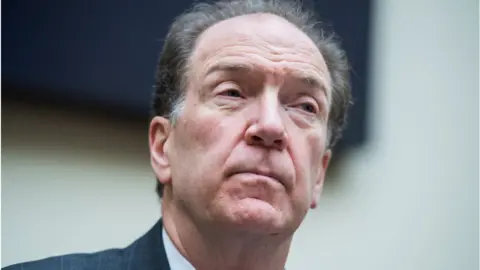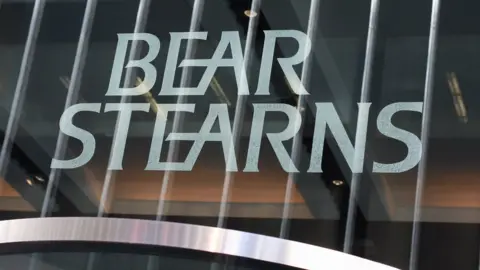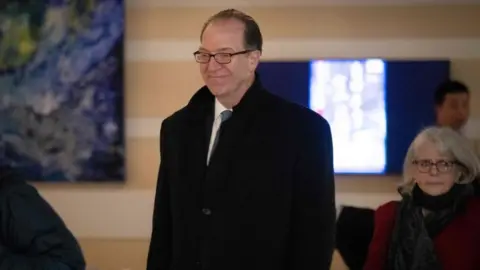David Malpass: Who is Trump's pick for World Bank president?
 Getty Images
Getty ImagesUS President Donald Trump has nominated David Malpass as his pick for the next World Bank president.
So who is David Malpass, and what opinions does he hold?
Mr Malpass, a Trump loyalist, was a senior economic adviser to the US president during his 2016 election campaign.
The 62-year-old has criticised the World Bank in the past, along with other institutions such as the International Monetary Fund, for being "intrusive" and "entrenched".
After senior roles in the US Treasury during the Reagan and George HW Bush administrations, Mr Malpass became chief economist at Bear Stearns bank. He was there for 15 years before the bank's near collapse in the 2008 banking crisis.
Bear Stearns narrowly avoided insolvency in March of that year after hedge funds got spooked by the investment bank's exposure to subprime mortgages. It was bought by rival JP Morgan for a fraction of its former value, with the backing of the US Federal Reserve.
 Getty Images
Getty ImagesMr Malpass left Bear Stearns three months later.
He was subsequently criticised for an August 2007 Wall Street Journal article in which he urged investors not to panic about the credit market.
"Housing and debt markets are not that big a part of the US economy, or of job creation," Mr Malpass wrote before the impending economic crisis. "It's more likely the economy is sturdy and will grow solidly in coming months, and perhaps years."
The New York Times also criticised Mr Malpass for that and other Wall Street Journal articles, saying partisan bias towards Republican policy by economists had "unquestionably contributed to their forecast errors".
After leaving Bear Stearns in 2008, Mr Malpass founded research group Encima Global, and held a number of directorships at finance firms.
In August 2017 Mr Malpass again took up a senior role at the US Treasury, becoming undersecretary for international affairs.
 Getty Images
Getty ImagesSince then Mr Malpass has pushed for the World Bank to halt lending to China, which he says is too wealthy to deserve such aid, and has harsh lending practices to other countries.
And last year, he was part of negotiations over a package of World Bank lending reforms.
The US agreed to back a plan for shareholders to inject $13bn (£10bn) into the World Bank and its private lending arm, with conditions that aimed to limit the bank's lending, and focus resources more on poorer countries.
The reforms are aimed at pushing more middle-income countries towards private sector lending, and limiting World Bank staff salary growth.
To become World Bank president Mr Malpass has to win approval from the institution's executive board, which has 25 members.
The US holds a 16% share of board voting power and has traditionally chosen the World Bank's leader.
China is the World Bank's third-largest shareholder after Japan, with about a 4.5% share of voting power.
Justin Sandefur, a senior fellow with the Center for Global Development, said the nomination of Mr Malpass showed that the Trump administration was trying to undermine a key global institution, and urged other countries to nominate alternative candidates.
"They have a choice. It's a simple majority vote, the US has no veto in this election and there are many better candidates," Mr Sandefur said.
